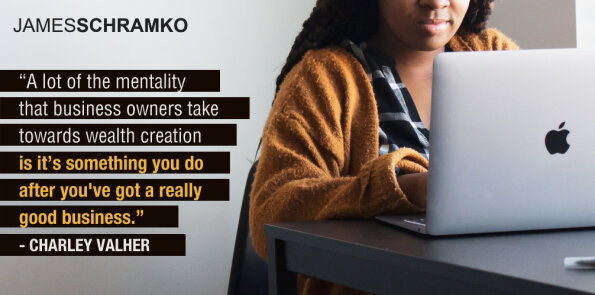If you're a business owner, there's a good chance you're not as wealthy as you could be. You might think that owning your own business would automatically make you rich, but that's often not the case.
So why is it that so many business owners struggle to build wealth? James and fellow entrepreneur Charley Valher dig into the money mindset and other factors that get in the way.
Podcast: Download (Duration: 47:06 — 46.9MB)
Get Notified Of Future Episodes Apple Podcasts | Spotify | Amazon Music | Android | Blubrry | Gaana | TuneIn | Deezer | Anghami | RSS | More
Episode topics:
With the prospect of fatherhood, wealth became a matter of some importance for Charley. [01:52]
The amount of money you make doesn’t determine how wealthy you are. [04:12]
There’s nothing like kids to spur you on to success. [05:22]
Why are so many business owners challenged when it comes to wealth-building? [07:21]
You want to keep some of the money you make, but when is thrifty living a sign of a scarcity mindset? [10:14]
Wiring and conditioning play significant roles in our ability to build wealth. [12:43]
Who are the Joneses you’re looking to keep up with? [17:24]
Can wealth make you more authentic? [23:29]
The past hugely impacts the money mindset we have today. [27:46]
Tell me who you hang out with, and I’ll tell you who you’re likely to become. [30:32]
When you’ve outgrown the crowd that got you where you are… [37:10]
Luckily, you can rewrite the money mentality you grew up with. [39:42]
Where do you go to get better educated about wealth? [42:25]
Make the most of your business journey with James’s help
Disclaimer: Neither James nor Charley are financial advisers. What they discuss in this episode is not financial advice, but their personal viewpoints and practices.
Editing note: Charley’s site is now Business & Investing
For followers of this show, our guest expert on the topic of wealth may be a surprise. Charley Valher has appeared before, talking about content marketing, in particular podcasting. Turns out, though, he also has a keen interest in wealth-building.
What sparked Charley’s interest in wealth
It began when Charley was shortly to become a dad. He was doing well in business, he says, but how he spent his money at the time was, in his own words, very reckless. He had a few investments and the like, but overall wasn’t financially responsible. And now he felt the weight of financial pressure on his shoulders.
This was something he had to cross, he decided, because if something were to happen to him, what would become of his partner, Bianca, and their son Jack?
Charley has been on his wealth-building journey for several years now, determined that whatever happens to him in business, his family will be alright. And as he became more financially independent and stable, he would talk to other business owners, and what he learned concerned him. Too many of them had yet to make wealth-building a priority. And knowing the potential consequences, he felt he had to speak out about it.
Making a lot of money doesn’t make you wealthy
James can relate. He was 23 when his son, also named Jack, was on the way. It drove him into sales, as it seemed then the best way to make a lot of money quickly.
“The making the money part is actually not where wealth is created.” – James Schramko
Making money, however, is not really where wealth is created. And most people think it is. Interestingly, a lot of people who make big money, or say they do, don’t have a lot of real wealth.
Discovering that was eye-opening for James. It was not uncommon during his time with Mercedes-Benz that someone would buy a car, then later appear in the newspaper as having gone bankrupt, or as part of a fraud scheme, or a chronic gambler at Star City.
He learned that, of the cars one sees on the road, most are financed, not owned. And a lot of people you would think are rich are not even close.
So why aren’t more business owners wealthy?
It fascinates Charley that business people, as a collective, are generally smart. And most of them go into business with the goal of financial independence. Why is it, then, that so many fail at making and keeping money? Some actually end up worse off than if they would have pursued normal employment.
James started his business inspired by his clients at the dealership – those who were genuinely successful. They impressed on him the idea that ownership and control were a path to wealth.
He left his job just as a global financial crisis was unfolding, not the first he’d seen. And he realized a business did give him a lot of control. He had a responsibility, however, to himself, for his own destiny, to keep innovating, to keep creating, to stay on his toes.

You can’t fall asleep at the wheel, if you are driving the vehicle. One of his podcast guests, Gino Wickman, makes the point that not everyone is destined to be an entrepreneur. Only a percentage of the population is suited to having the level of risk-taking, and responsibility, and creativity and structure that is required to run a business. In fact, the vast majority of businesses last only three to five years.
If you make it past that mark, and successfully, says James, you’ve ticked the first box. You actually can become independent, and you can achieve control, and you can create something for yourself. But where he sees people get stuck, as a coach, is they have the front end machine going, but the money is not saved.
The balance between saving and living
James knows someone who makes about $12 million a year. Of that, he nets only three or four, after costs. And where does that go, James asked? Living, the guy says. It all goes on living.
A nice living, says Charley.
Travel around the world, food experiences and stuff, says James. And that’s one way to do it. You decide what’s important to you, because we don’t know how much time we have. One lady in his community passed away giving birth, at 41.
On the flip side, he had a client in his 60s, worth more than $100 million. His secondhand clothes had stains. And he was looking for a secondhand Mercedes-Benz, something for $50,000 to $60,000, when he could have easily bought the dealership. Life was difficult for him on the way up, he told James, so buying something new seemed excessive.
For most people listening, there’s probably a middle ground, James says. His own philosophy is to build wealth, but also enjoy life as if it won’t go on forever. Hence surfing, and travel and experiences. But he’d also like to provide for his child, at least till she reaches adulthood, should anything happen to him.
Charley agrees. He and James are not financial advisers, but he hopes the message is clear – you must build wealth, and you must live. He thinks it’s imperative.
Where wiring and conditioning is huge
This is what trips up so many business owners when it comes to wealth – wiring and conditioning. Some people spend all their money on looking rich rather than being rich. And when their income grows, says Charley, they just take status to another level. Very often they end up in the grind later in life.
Then there’s people like James’s nine-figure client. How many opportunities in life has he passed up on? The events he didn’t go to, the people he didn’t meet… Status has value, Charley says, in giving you access to business opportunities. He used to live in Brighton, Victoria, which some will recognize as a rich sub. And he did some great business deals there. If James’s client never spent his money to associate with the right people, what could he have missed?
The other side is where people take thrifty living to a level that almost makes them bitter. They constantly feel they can’t do things, because they’ve got to save. Who wants to live like that?
And who wants to be around them? James recalls a friend of a friend scrounging through a bin for a half-off coupon on a movie ticket. That was too far, he thought. Not fun.
Some conditioning starts very young, says James. He heard a small kid at the park say they couldn’t afford something because their mom was a nurse. People say terrible things to kids, he says. Money doesn’t grow on trees, we can’t afford that. James has talked about it with Marisa Peer on a previous episode, and also with a lady expert on early childhood development.
At 18 or 19, James decided to change the script on his life. He started by buying and reading classic books on business and wealth – Noel Whittaker; Rich Dad, Poor Dad; Fitzgerald on property development.
Step one is to question, how is your wiring and conditioning? What do you believe is true? And why do you believe that true? And are you open to the suggestion that maybe there could be a different truth or a different way of looking at things that you could switch to? For James, that was the big change.
It’s huge, massive, says Charley. And it’s what he loves about being a business owner, that they don’t live in a world limited by a set wage, where the only way to do more is to spend less.
Who are the Joneses in your life?
The idea of keeping up with the Joneses cracks James up, because he used to race sailing boats with a mate by the name of Jones. Every year now, they catch up at dinner, and James gets to hear what they’re up to and benchmark off the Joneses. Have they discovered Facebook? What are they doing with their kids and their investments and work? It fascinates him.
 But one of the greatest skills of all, says James, is to not really care too much about what the Joneses are up to and to run your own race. You can get into such a different race that you can’t even compare, at some point. That’s sort of where James ended up. He’s in a different world to most of the traditional peers he grew up with.
But one of the greatest skills of all, says James, is to not really care too much about what the Joneses are up to and to run your own race. You can get into such a different race that you can’t even compare, at some point. That’s sort of where James ended up. He’s in a different world to most of the traditional peers he grew up with.
Charley wishes he could say the same for himself, but he’s found he’s a very competitive person. What he has done is accepted that he’ll want to compete with the Joneses. He just has to be very careful who the Joneses are.
Charley has decided his Joneses are people who have built significant wealth. He wants to adopt the traits and habits that they take. So the competition is on net worth, or their monthly cash flow in from investments. What if those were the discussions they were having? And as he delved into the world of wealth-building, this thinking has had a big influence on him.
The goal James is competing with is working out the cost of living, and then figuring out how he can get paid more than that in passive income. That’s his Jones, the target that makes life optional, where you don’t have to do things you don’t want to do.
If you can use other people’s positive examples as benchmarks, he says, then that’s healthy. In some wealth creation clubs and groups, they’ll benchmark you with other customers, or show you what’s possible.
They might say, These people are able to reach passive income level that exceeds their cost of living within three years, or five years or whatever. Then you can decide, that’s a goal I would like for myself. I’m now going to compare my current me to the future me and narrow the gap.
Is there a correlation between wealth and authenticity?
What Charley has found interesting is, the more financially independent he’s become, the more authentic he’s been with himself and the things he likes. Before he actually had money, he was more interested in looking rich or owning status objects. Now he feels less pressure to show status. Has James experienced something similar?
It is literally what James was just saying, that as you become more confident in your own skin, and comfortable with yourself, you could care less what other people think.
And he doesn’t mean it’s bad to have nice or expensive things. He thinks the only reason it’s not super important to him anymore is because he’s already experienced it. He’s bought the $200,000 car. He’s traveled around the world. He’s lived in lovely houses, owned the great watch, the nice shoes. You’ll realize in the end, he says, that none of that is the end goal. For him, it was just part of the journey to get to who he is now, a surfer in T-shirts. That’s who he is, and the rest of the world can run their own race.
If you’re going about life right now needing to prove to everyone else how significant you are, just look inside yourself a little more, says James, and give yourself less pressure.
He does agree with Charley. Some of what he’s achieved took money and status, to go on flights and get accommodations. But he’s in a good place now. And for those thinking, well, it’s great for you, he also had a tough phase. He did eat beans and crawl over broken glass to get where he is. It’s almost inevitable, and it’s difficult for people starting out. Because in wealth creation there’s the capital creation part before the putting the capital to work part. He does think having a business fast tracks wealth creation if you get it right. But he encourages people to get good help turning it into something useful.
The influence of the past on money mentality
One thing that gives James peace of mind is taking money out of his business and putting it somewhere else. It comes in large part from his experience as a kid, when his parents were badly hit by a recession.
“You need to be all-weather ready.” – James Schramko
James has seen general economic crisis at least twice, and expects to see it again. Maybe the pandemic counts as a third, he’s not sure. But he has seen what can happen and says we need to be all-weather ready.
With Charley, it was a workplace accident that kept his father from working, and wired into Charley that it was risky to have all your wealth in your business.
James’s father was terminated, while both their car and house was on finance. So now within his business, James likes to diversify income streams. You want to get paid by lots of people, he says. So create value for diverse customers – different geographic regions, different price points, different product lines.
 Another reason Charley thinks business owners struggle with wealth creation is business is just hard. A lot of business owners are stuck in the day-to-day battles of running their business and put wealth creation on the back burner. A lot of the mentality that business owners take towards wealth creation is it’s something you do after you’ve got a really good business. What Charley and James have achieved is to do it in tandem.
Another reason Charley thinks business owners struggle with wealth creation is business is just hard. A lot of business owners are stuck in the day-to-day battles of running their business and put wealth creation on the back burner. A lot of the mentality that business owners take towards wealth creation is it’s something you do after you’ve got a really good business. What Charley and James have achieved is to do it in tandem.
What the right mentors and peers do for you
What would Charley suggest, James asks, to business owners in that sort of hand-to-mouth phase, in survival mode?
Good mentors and peers, says Charley.
James is thinking the same thing. Get help. And there’s no reason for your business to be scraping off the bottom if you have a really good product, if you care about your customers, if you can get them results, and if you can share those results with others, even through some humble marketing campaigns.
If you can build an email database, if you can make offers to the database, if you continue to look after people for a long time, then those are some of the fundamentals. If you’re working with a market that’s not dead, and you build your experience, and you learn and study and surround yourself with other people, then you’re going to get off the bottom line.
And then it’s simply a case of, what’s your strategy? Some people just tip everything into scaling, because they want the big payday. James likes to say, I have a great cash flow business, I’m going to bring some of that cash flow out, and put it somewhere else. Because if I just want to turn the business off one day, I’ve still got the somewhere else.
Charley has known James a while now, and recalls little things he’d say, like, this guy’s doing this much revenue. Those things start to cement what’s possible, says Charley, which makes a massive difference.
And then being able to get advice from people who’ve done it shapes you differently. So network and peers is huge. If you surround yourself with people focused only on growth, there’s a great likelihood you’ll become the same. And if you hang out with business owners also interested in wealth, it’s very likely you’ll develop the same mindset.
 Likewise, when you get to a certain point in your wealth journey, you have to consider, maybe the network that got you to here, and the mentors, aren’t the ones that get you to there. So even if you like them and they’re good people, you may have to spend less time with them and associate more with people who continue to inspire and educate you. The worst place to be in, says Charley, is where there’s nothing new to learn or grow from in your network and mentors.
Likewise, when you get to a certain point in your wealth journey, you have to consider, maybe the network that got you to here, and the mentors, aren’t the ones that get you to there. So even if you like them and they’re good people, you may have to spend less time with them and associate more with people who continue to inspire and educate you. The worst place to be in, says Charley, is where there’s nothing new to learn or grow from in your network and mentors.
“The worst place to be is where there’s nothing new to learn or grow from in your network and mentors.” – Charley Valher
Rewriting the rules you were raised with
James thinks growth and learning are trigger words for him. To some extent, he’s a bit of a one-man wolfpack, because he does a lot of inward reflection and has a lot of thinking time. And he gets so much input from his coaching work. he’s surrounded by successful people. That’s something other people probably need to assemble.
“The minute you stagnate, it starts to slide back.” – James Schramko
And James joins things, he take courses, he reads books, he absorbs information. The minute you stagnate, he says, it starts to slide back.
But one thing they haven’t talked about, that he thinks is relevant, is, there was a point when James realized he did not agree with the notion of working till he was 65, so he could get his superannuation or 401k. Then what, hang out at home? What a waste of a life.
Going back to wiring and conditioning, a lot of people are products of an old era, where you sit in school and take instructions, then get a job where you follow a system and don’t think too much.
If you are an organic business owner, says James, feel free to rewrite the rules on wealth creation, as well. There are ways that you can accelerate your wealth-building, far better than putting your money in the bank.
If you want better information about money…
So how do you get educated about money? James speaks to people, asks what they do. He’s also read books. And he’s sought out wealth coaches and found access to programs not commonly available. There’s a whole secret world of things you can invest in when you actually have the money. What can Charley recommend? James knows he has a newsletter.
Charley does. And the reason he started Business & Investing, a podcast, and the newsletter that goes with it, is because he felt finding good info for wealth building, as a business owner in Australia, was incredibly hard. No one was doing it.
What he’s found is that some wealth-building in the States doesn’t apply in AU, and that the needs of a business owner are different versus someone employed. He’s put all his learning into his show and newsletter, to help Aussie business owners shortcut the education path involved in building wealth.
You can sign up for the newsletter at https://businessandinvesting.com/newsletter-signup/ (which Charley admits is too long, and he should totally make a better link).
And if you have ideas for this podcast, a topic you’d like James and Charley to discuss, send it to James, [email protected].
Get better educated about money – check out Charley’s podcast, Business & Investing
Or get help with your own podcast at ValherMedia.com
Enjoyed the show? Leave us a review on iTunes









Leave a Reply